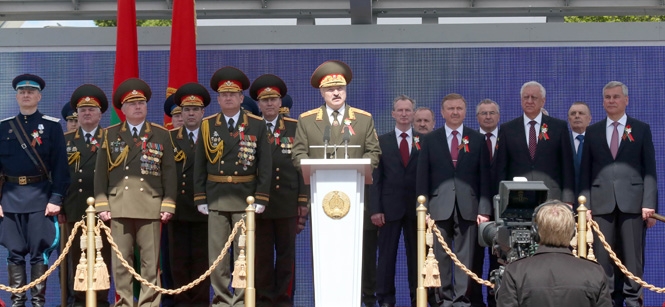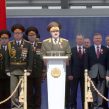
Victory Day and Belarus’s Diplomatic Offensive
Publication: Eurasia Daily Monitor Volume: 12 Issue: 96
By:

On May 9, Belarus celebrated the 70th anniversary of the end of World War II. According to Emmanuel Ioffe, an authoritative Minsk historian (no relation to this author), the overall number of Belarus’s casualties in that war amounted to 3,074,000, whereas the country’s population on the eve of war was 9,183,000, within current borders. No other country lost as many of its people relative to its pre-war population. The Minsk-based Museum of the Great Patriotic War refers to a more conservative death toll—2,357,000; but according to Ioffe, this number does not cover all deaths among partisans, collaborationists, and among the 400,000 Belarusians transported to Germany as forced laborers (Svaboda.org, May 8). Considering the enormity of the casualties and the fact that Belarusian identity had not quite crystallized before the war, it is little wonder that modern Belarusian self-awareness is inseparable from the war effort, which is often viewed as the starting point of national consolidation. It would also be safe to say that in the area of national memory, Minsk’s official narrative of the war has won the hearts and minds of most Belarusians.
Still, ideological clashes continue. An excerpt from the essay by Vadim Gigin “Thoughts about Victory Day,” published on May 8, highlights this narrative’s battles. Gigin edits Belaruskaya Dumka, an official socioeconomic and political periodical, conducts a talk show on Belarusian TV, and writes a column on Belta, the government news agency. “There are many insinuations regarding the war,” he writes. “Few people have the gall to openly defame victory (because the number of outright crazies is limited after all). So the reasoning they employ is like this: ‘Yes, we are not against victory, but we did not fight the proper way, we almost started the war ourselves; we do not celebrate on the right day and do not use the right symbols. It would be best if there were no [Joseph] Stalin, if the Union were not Soviet, if there were no Communist Party, and if all the political commissars and security officers had been long dispatched to Mars. If that were the case, our joy would be more genuine.’ What can one say to this? It is high time to perceive and appreciate our history the way it was… [Alas,] the taint of collaborationism or quisling-like activity has not disappeared. Simply it is a different time and conditions have changed. Then, the traitors of the Motherland volunteered as policemen, handed over the Jews [to the Nazis] and shot their fellow countrymen in the back. Now, their spiritual heirs scribble their articles and express indignation over the military parades. In terms of form, these are different activities, but in terms of substance, these are the facets of one and the same phenomenon” (Belta, May 8).
In his speech at the Moscow-based “informal meeting” of the leaders of several post-Soviet countries, President Alyaksandr Lukashenka addressed a different kind of alleged misinterpretation of the war effort. “We are not bookkeepers to be busy calculating the percentage contributions of [different ethnicities] to the victory. It is not that a Russian or a Belarusian, or a Kazakh, Kyrgyz, Uzbek or Tajik won; it is the entire Soviet people that did” (Tut.by, May 8). The veteran opposition journalist Alexander Klaskovsky, meanwhile, observed that Lukashenka perceives himself as a spiritual heir to the Soviet, not to the Russian world. Lukashenka’s words that “we turned out to be lousy heirs to those who won the war as we have not rescued, not retained the country that they defended” suggest Klaskovsky is on target (Naviny.by, May 8).
In his speech at the opening of the military parade in Minsk, Lukashenka cited international military experts who see the Belarusian army as one of the strongest in Eastern Europe. He also opined that the tragic lessons of the Second World War have been forgotten as Europe and the world at large are nearing a dangerous point. Lukashenka underscored that the participation of both the Russian and the US military personnel in the parade in Minsk was “profoundly symbolic.” And he suggested that the experience of the national leaders of the Allied coalition can now be useful as they found a way to overcome seemingly irreconcilable differences and jointly defeated fascism (Tut.by, May 9). However veiled, this was effectively the third public appeal by Lukashenka to the United States to join the negotiations on resolving the crisis in Ukraine. And while the subsequent May 18 visit by Secretary of State John Kerry to Russia may have had nothing to do with those appeals, it fit the Belarusian president’s reading of the conflict and of international affairs at large.
One way or another, Belarus’s success in its rapprochement with the West appears to be working—and evidently without having to cave to the West’s demands (e.g., on the issue of political prisoners). At least three new achievements along this line stand out. First, all the obstacles that stood in the way of Belarus concluding a visa simplification process with the European Union have reportedly been resolved (Tut.by, May 14). Second, on May 14, Belarus joined the Bologna process and the group of 47 countries forming the common European Higher Education Area. Third, on May 14, US and Belarusian officials met in Washington to discuss human rights, civil society and democracy (State.gov, May 18). While no substantive breakthrough was expected from these talks, they nonetheless constitute a positive change in the climate of bilateral relations.
Finally, on top of Belarus’s international relations success on its western flank, China is opening credit lines for Belarus worth $7 billion. In the nearest future, $3.5 billion will be borrowed for the realization of industrial and infrastructure projects (Tut.by, May 12). Yury Drakakhrust of Radio Liberty even suggests that besides economic benefits, Chinese loans and investments provide Belarus with new leverage—against Russia. Indeed, Russia is no less jealous and suspicious of Chinese activities in Belarus than it is of those of the West. And “if there is jealousy, fidelity becomes pricier,” remarks Drakakhrust (Tut.by, May 14).




